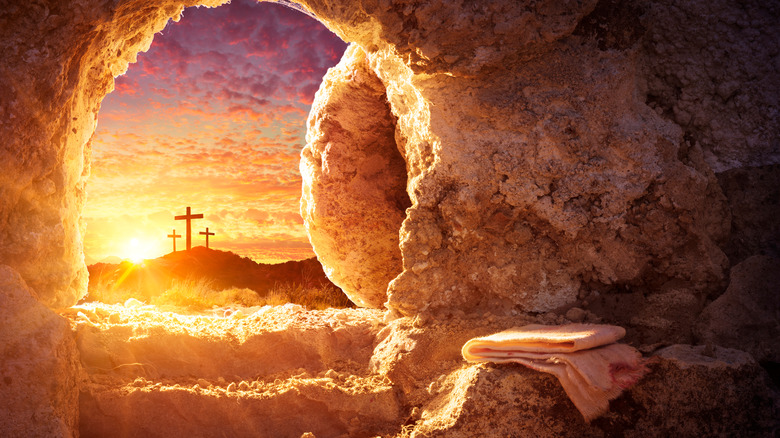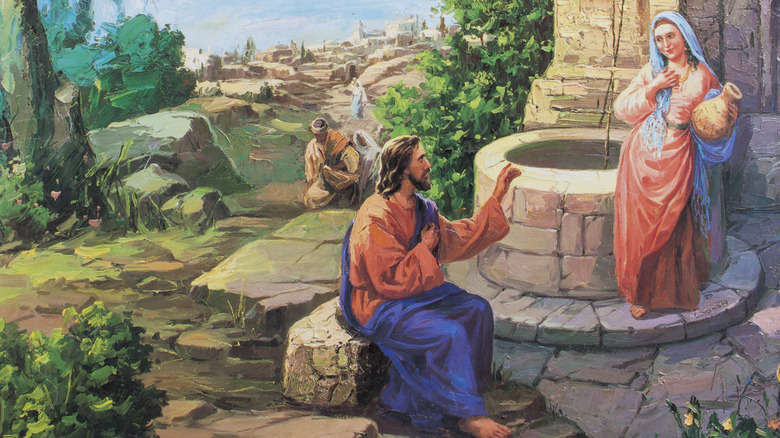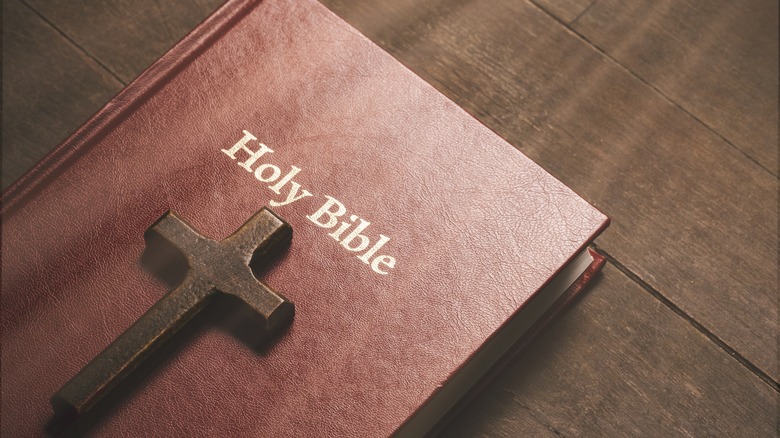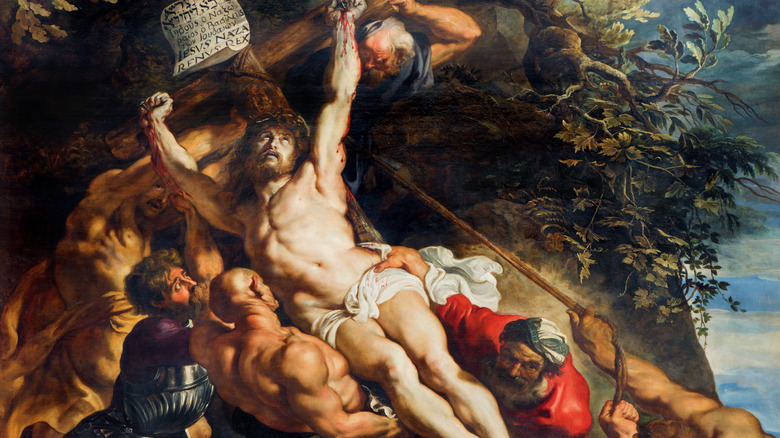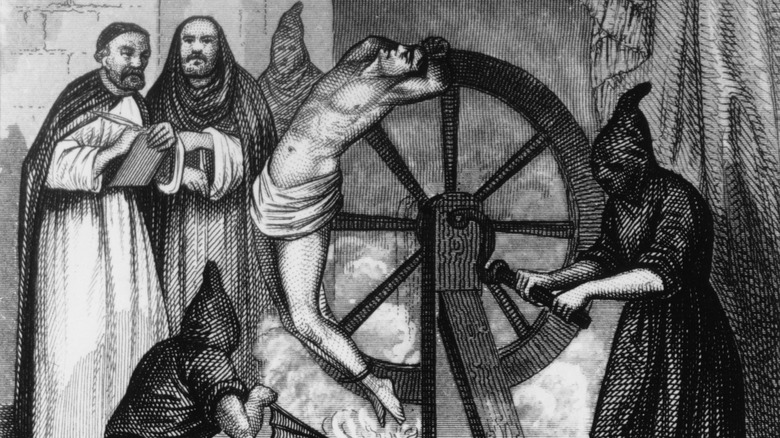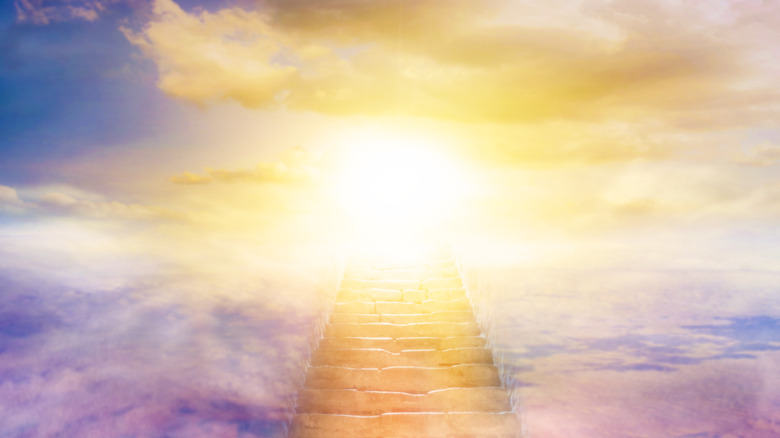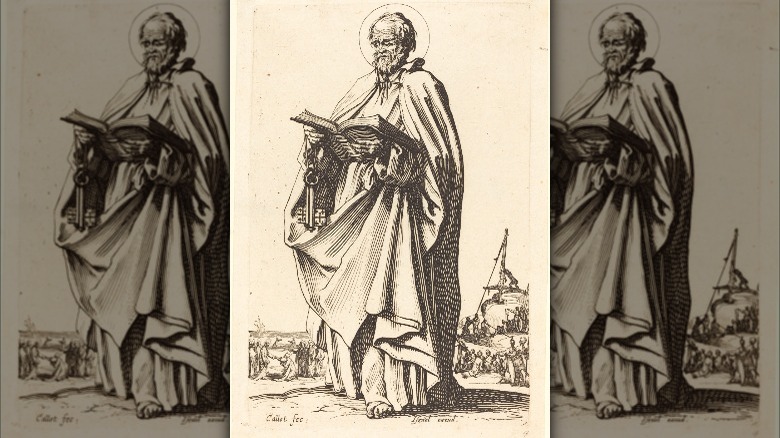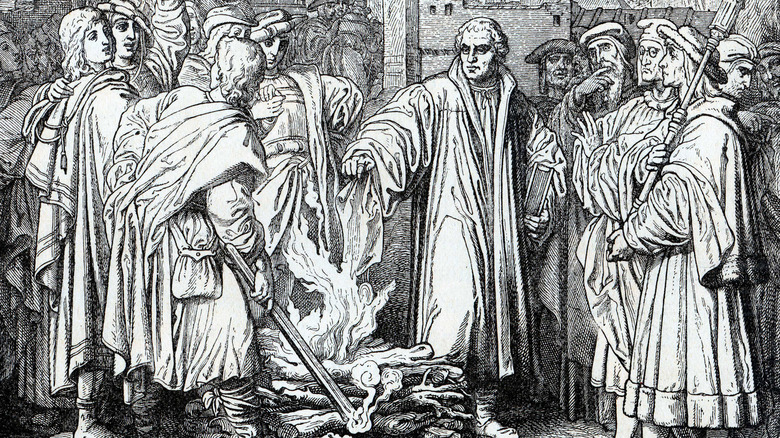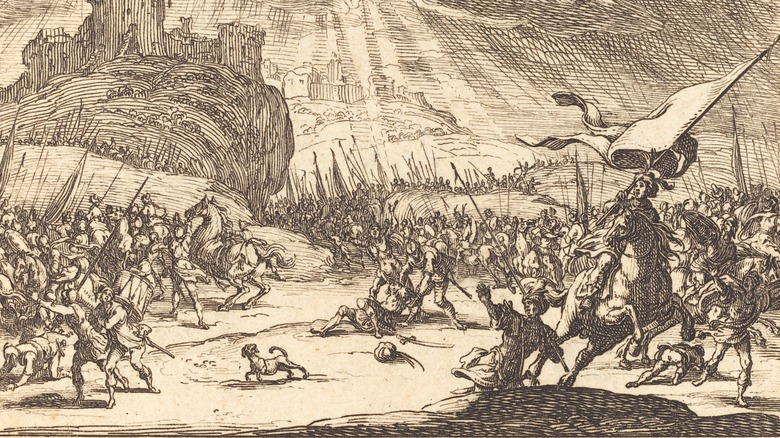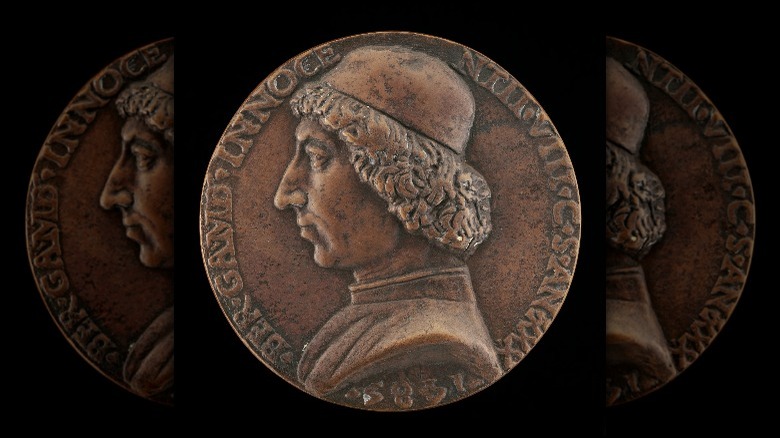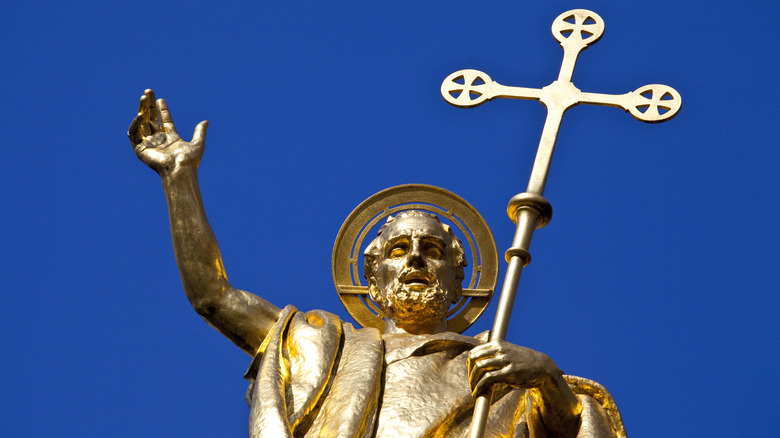The Untold Truth Of Christianity
Christianity has come to define the modern world in both good and bad ways, and this all stems from the simple fact that it is the most prominent religion out there. Roughly 31% of the population of the earth — over 2 billion people — call themselves Christians, according to Britannica, and however you shake it, that means that Christian doctrine has worked its way into various laws and constitutions around the world, no matter if everyone believes in them or not.
It began with Jesus Christ, the messiah of the Christian faith, and solidified into a church after his disciples took up the charge following his death and resurrection. Through centuries of growth, persecution, and splintering, it has grown into a faith with beliefs so widespread across sects that it can often feel like entirely different religions. Though no matter the division, it always does — or at least should — center on the life of Christ.
And yet, any time something is as old as Christianity, there are going to be some hidden secrets, darker plot lines, or common misconceptions. This is no different. Here are the untold truths of Christianity.
Jesus had no gender bias
Speaking as a whole, older religions have a hard time navigating gender, as indicated by a study by American Progress. Women are often portrayed as lesser and subservient, and the same conclusions can be drawn by picking one of many stories in the Old Testament (via World History Encyclopedia). Even stretching into modern-day Christianity, women are not allowed to be priests in either Catholic or Orthodox traditions, and in Protestantism, there are some hold-outs as well.
Which is unfortunate, because Jesus Christ himself put great faith in women and never once treated them as lesser than anyone else. Consider the point made by Lynn Marie Kohm's article "A Christian Perspective on Gender Equality." In it, she argues that Jesus was actually quite revolutionary in his treatment of women. Jesus gave them a literal seat at his table and a place among his disciples. This list of examples includes his discussion with the Samaritan woman at the well, as well as Mary being the very first person to see him alive after his resurrection — a decision that was a choice, and not mere coincidence.
So while it's frustrating to see the church built around Christ not allotting women the same opportunities to serve as men, the more frustrating part is that Christ himself clearly would have done things differently. Mostly because he did do things differently.
The Bible is not a single book
Though "The Bible" is the all-important book of Christianity, it is not a singular book, nor is it just a book split into freestanding chapters. It is a compilation of different books that were compiled over a thousand years, according to BBC, dating from 1200 B.C. to the first century A.D. It includes a wide swath of genres, from poetry to epistles to histories, and not all Bibles agree what books belong in their compilation manuscript.
While the Council of Nicea is generally cited as the source of what did and didn't make it into "The Bible," that's not the case. The compilation of the Bible really came down to individual taste. For instance, Martin Luther, the forefather of Protestantism, didn't like the book of James, Jude, Revelation, or Hebrews, so he put them at the end of his Bible, according to How Stuff Works. Expanding on that, most Catholic Bibles have 73 books, including the Apocrypha (which houses the Book of Mary); most Protestant Bibles have 66 books, and the Orthodox Church often includes 81, adding in such books as Jubilees.
All this to say that there is no "Bible," just a bunch of different Bibles with a bunch of different thoughts as to what is and isn't required reading for their followers.
It's the most persecuted religion in the world
It makes sense that the biggest religion in the world is also the most persecuted, but even still, the numbers point to Christianity getting hit harder than you might think over the centuries of development. According to the group Open Doors USA, last year, 360 million Christians lived in a state of intense persecution around the world. Add to that some more numbers — 5,600 murdered, 6,000 detained or imprisoned, 4,000 kidnapped, and more than 5,000 places of worship destroyed (via the Cato Institute).
This prevalence is seen in countries like Afghanistan, North Korea, Somalia, Libya, and more, but that's just the modern-day of persecution. Tracing this back to the foundations of the faith, the theme of persecution began right away in Roman times, according to Britannica.
While various averages will claim that 100,000 Christians are martyred every year, BBC debunks this number by pointing out that most of this comes from the war in the Congo, where two Christian factions were killing each other. Even still, BBC settles on a figure of around 10,000 Christians being murdered for their faith every year, which still places them atop the list as the most persecuted religion in the world.
The inquisition happened
Christianity has its share of black eyes. Given centuries of theocratic kingdoms, there's really no avoiding that kind of outcome, but the chief splotch on the record of the most prominent faith in the world is the Inquisition, a time of widespread murder and destruction put on by the Catholic church with the aim of stomping out nonbelievers.
According to History, it began in the 12th century and lasted for hundreds of years, with the end result being around 32,000 people being murdered in the name of God. The whole process is rather predictable but no less gruesome. A heretic was accused of heresy and required to testify. If they denied being a heretic, they were tortured until they confessed. Naturally, this was not the work of God at all, but the work of corrupt church figures intent on solidifying their own power. There are many infamous examples to come out of the Inquisition, including the burning at the stake of Joan of Arc, who went on to become a figurehead for various movements.
The Spanish Inquisition became its own thing, according to History, with Torquemada rounding up 20,000 Jews-turned-Christians and essentially blaming them for everything wrong with the world. Some confessed, most were tortured, a lot were burned.
You cannot reach heaven by being morally good
One of the main reasons that Christianity has such a big following is because it's just so approachable; all Christians have to do is believe in Jesus Christ, and that seals their post-death trip to heaven. In fact, in the Christian faith, it's impossible to reach heaven any other way. Good works are encouraged, but they don't allow admittance through the pearly white gates. Not unless a person is absolutely perfect and — spoiler alert — no one is. And as The Christian Worldview points out, no one will get away with any crimes on earth. The Book of James puts it pretty clearly in 2:10: "For whoever keeps the whole law but fails in one point has become guilty of all of it."
After all, every single Christian must face the final judgment before God, at which point every sin will be laid bare before them. There's no way anyone could think to approach that situation with a clear record. Hence the purpose of Jesus — to provide a way for love to trump the works of imperfect humans.
St. Luke makes it rather easy to understand in the Book of Acts: "Believe in the Lord Jesus, and you will be saved" (16:31). Of course, the caveat is in the word "believe." While most people believe that Jesus was a person who lived, salvation comes from believing that he died for the sins of the world and was resurrected.
Peter was the first Pope
Peter had a big role to play even when Jesus was still around. Britannica refers to his presence among the disciples as a "leader," but his time with the messiah was pockmarked with instances of doubt, anger, and lack of forethought. He was, after all, the disciple who famously denied knowing Jesus three times, before succumbing to a severe depression when he realized that Jesus had predicted that exact thing would happen.
Call them growing pains, because when Jesus moved on, Peter rose into the position of leader, even if he never had it before. Britannica estimates his time in power at around 15 years. His leadership saw him expanding the ministry and moving it forward, including replacing Judas with Matthias in the Apostles, speaking up as the church built around the teachings of Jesus, and directing the disciples to take the ministry out into the world, which he himself did as well, traveling to Samaria and down the Mediterranean.
However, after being arrested and subsequently set free by an angel, Peter went, rather nondescriptly, to "another place," presumably to lay low as the persecution of Christians had gotten pretty heated. By this point, though, the seeds were sown, and Peter was the one who first watered them.
There are three main denominations
Like any religion that has been around for millennia, Christianity has a mess of denominations that now number at 45,000 according to Live Science. From the Amish to the fundamental Baptists, the beliefs span a wide swatch of ground that all center around the teachings of Christ and his status as a divine being turned man. Despite having so many denominations, there are only three major divisions that they can all be filtered into. The biggest of them all is Catholicism, counting 1.34 billion members as of 2019, per National Catholic Reporter. That comprises 17.7% of the population of the world.
The second denomination is Protestant, the offshoot that stemmed from the work of Martin Luther. Protestants total around 800 million, according to Learn Religions, and are responsible for many of the sub-denominations that now populate the Christian landscape (via Benedictine University), beginning during the Protestant Reformation in 1517.
The third denomination, caused by the Great Schism of 1054, are the Orthodox Christians, including both Eastern Orthodox and Oriental Orthodox (via Britannica). There are about 260 million Orthodox Christians, nearly half of which are located in Russia, according to Learn Religions.
Christianity and science get along better than you think
For a very long time, it was widely assumed that the belief system of Christianity did not jive with either the Big Bang theory or evolution in general. After all, the Big Bang theory pointed at a different origin point in the universe and clashed with creation, while evolution didn't mesh with the idea that God the Father created humans and animals as they were. But that narrative has changed a lot in modern days, even if it's not all the way there yet and may never will be, according to the Washington Post.
Pope Francis himself said in 2014 (via NBC News): "The Big Bang, that today is considered to be the origin of the world, does not contradict the creative intervention of God; on the contrary, it requires it. Evolution in nature is not in contrast with the notion of [divine] creation because evolution requires the creation of the beings that evolve."
No spin is required thus far. That's the head of the Christian world acknowledging the commingling of science's two biggest beefs with the Christian worldview. However, as Gizmodo points out, this is not the first time that a Pope has come out and tried to soothe the sharp edges between the two sides. In 1950, Pope Pius XII came out with his "Humani Generis," in which he acknowledged the church's understanding of evolution, even with Darwin's "Origin of Species." As long as it's understood that the soul is not a matter of evolution, but a creation of God. Still, it's a far cry from the one-or-the-other narrative that many Christians grew up with.
A church is not a building
Pass any place of Christian worship on the street and you'll see a common term: Lutheran Church, First Baptist Church, Methodist Church. It's enough to assume that the word "church" refers to the building, much like how in Islam, "mosque" refers to the same. That's not the case. As Fellowship Church puts it, there is no building required to form a church, all that's needed is a gathered people.
Of course, this even worked its way into that catchy little Christian song, "I am the church! You are the church," in which every verse talks about what the church is and isn't before ultimately (and frequently) concluding that "the church is a people."
The idea behind this, as explained by Fellowship Church, is that Christians need each other in worship; spiritual growth comes from praising God together, and that when you bring all these people together sharing the spiritual blessings among each other, that's all that matters. That's the church.
Paul was instrumental to Christianity
Christianity came from the teachings of Christ, and it was organized under the leadership of Peter, but the faith may well have petered out altogether if not for another of the Apostles — Paul. Paul's story, according to Britannica, is actually quite fascinating — he was once a persecutor of Christians named Saul, but in an encounter with Jesus himself, he had his mind opened and saw the way of the Lord. Just like that, Saul became Paul, and Christianity gained one of its greatest proponents from one of its worst enemies.
Cold Case Christianity details the full works of Paul, including writing 13 or 14 books in the New Testament. German Biblical scholar Gerd Ludemann even wrote a book titled "Paul: The Founder of Christianity" in which he makes the thinly-veiled claim that Paul was the founder of Christianity — meaning that he did more than Jesus and more than Peter in the expansion of what would become the most prominent religion in the world.
According to Cold Case Christianity, it was Paul's letters to populations like the Corinthians and Thessalonians — as included in the New Testament — that helped progress their understanding of the faith and welcome new followers with efficiency and expediency.
The office of the Pope has a sordid history
So much of the composition of Christianity comes from the Pope. He is, after all, the head of the world church. This makes things a bit murky when you start considering what some of these Popes have done over the years, and how their decisions were motivated. The most obvious example is the Protestant Reformation. Thanks to papal misfires of power, like charging the faithful money to be absolved of sins (via National Geographic), the Christian church underwent its greatest upheaval in half a millennia, and it led to the founding of Protestantism.
But the murky underbelly of papal power goes deeper (and darker) than just a massive schism (or two). Consider Pope Alexander VI, who bought his way to the papacy, used nepotism to fill his vacant offices, fathered hordes of children, and had his rivals murdered. Or there's Boniface VIII, who infamously appeared in Dante's "Divine Comedy" for his political domineering that saw him elevate himself above all the armies in Europe in an attempt to seize power. These two appear on CNN's daunted list of shameless Popes, but let's not forget Pope (not-so) Innocent VIII, who tried to stave off death by transfusing the blood of three 10-year-old boys into himself, killing them all in the process (via "The Story of a Blood Transfusion to the Pope").
These are the acts of tyrants and criminals ... who just so happened to be Popes too.
There's a process to becoming a saint
Catholicism holds the saints in the highest regard, even going so far as to offer prayers directly to specific saints depending on what's needed — for instance, if you want safe travel, pray to St. Christopher (via Catholic.org). That said, it's not like the rest of Christianity treats the saints like chumps. They are revered across the board, even if not universally prayed to.
Lucky for the Christian world — most Catholics — new saints can and are still canonized to this day. There's actually a step-by-step process to becoming a saint, should any have such high aspirations themselves. BBC breaks down the entire process. The first step is to have been dead five years, unless this is waived by the Pope for whatever reason. Step two is to have the life of the deceased examined by the church. This includes an entire life review, testimonials, and a collection of evidence. If they can be declared a "servant of God," they pass step two.
Step three is similar. It's like a posthumous trial of merit, with the goal being to find evidence of "heroic virtue." If such evidence is found, you move on to step four, which is where things get really interesting. Did they perform verified miracles, like curing diseases? If so, move on to step five, which is canonization and sainthood. Of course, there are more intricacies to it than that, but that's the gist of becoming a saint. Good luck, and godspeed.
